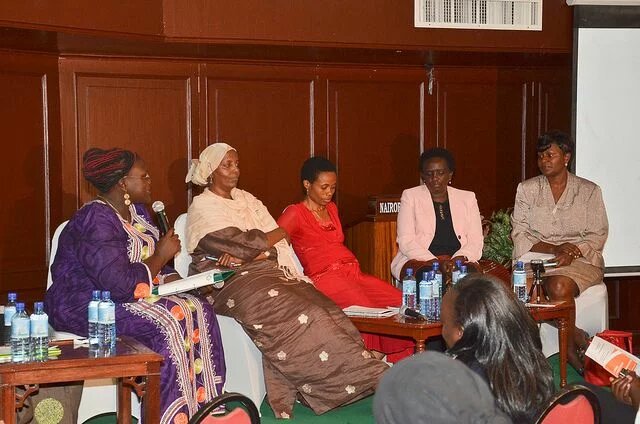
Whether or not to have Affirmative Action Quotas is not the question, the big question is how to make Quotas enrich transformative governance and peer-reviewing strategies adopted by different countries. This was the theme of discussion at the public forum, held on 26th September 2013 at the Safari Club; where members of the public, parliamentarians, civil society actors, academics and grassroots women organizers converged to delve deeper into the subject of engaging more strategically in positioning women to positively exploit the democratic space available to transform society. Being the culmination of a three-day peer-review exercise among women leaders drawn from Kenya, Uganda, Tanzania, Rwanda, Burundi, Somalia, Somaliland, South Sudan and Ethiopia, the forum was unique and very informative because participants were able to freely share lessons about the status and impact of Quotas in their various countries.
The panelists, for instance, brought to the fore diverse but useful interests and perspectives about the current standing of African women in society and what important priorities need to be put in place to spur not only the presence but also the influence of these women, for all members of society to enjoy the fruits of ideals such as democratic freedom. These women included Hon. Buntu Jalia Aboli from Uganda, Hon. Nyayang Longrick from South Sudan, Hon. Said Musa Ahmed from Somaliland, Ms. Janet – a gender activist from Burundi and H.E Joy Mukayange, a retired Diplomat and Gender Activist from Rwanda.
What emerged from the peer to peer experience sharing was first, that Affirmative Action did not just find itself in the Constitutions of various countries; it was through sheer hard work by women. The women put aside their differences – ideological, religious, generational, and status among others, and forged a common and united stand, to be able to firmly anchor Quotas in their Constitutions. Two, mobilization and awareness creation among women was necessary. In many of these countries, women leaders from all walks of life mobilized each other and sharpened each others’ quality of debate and engagement. This was achieved through seminars, training, political-party engagement, and media engagement as well. This was and still is important to make the women factor in national leadership to count. Three, accountability was a key message that was communicated as being paramount to the strengthening and re-energizing the women’s movement. The women challenged those among them with positions of authority to perform well, as a measure of spreading the word that women too can make outstanding transformative leaders in the public arena. This was especially exemplified in the Burundi structures of the women movement where nothing happens for them without them. They are consulted on all matters gender as relates to the effective functioning of the nation. The women in turn hold accountable those in leadership.
This notwithstanding, some countries like Somalia are still grappling with clannism in national politics; a factor that has perpetuated the locking-out of women from key and influential government positions. However, progressive changes are being realized with more women getting elected and appointed to national office. For instance, at the moment, the Somalia parliament has 13.9 per cent women representation – a drastic increase from a mere 0.6 per cent women representation a few years ago.
One important lesson to be emulated that was shared was the need to document the progressive realization of 50/50 gender parity in public leadership and political processes. This is important because it ensures that no story is lost, and two, that information, values and the spirit of the struggle are passed on from one generation to another for posterity.
This interactive session extended into plenary, with some members of the public seeking to understand the mode of quotas from different countries, as they vary. On a general note, the countries in the East and Horn of Africa practice three kinds of quotas namely; the geographical Quota, Political Party Quotas and the Parliamentary Quotas. These vary from country to country depending on the structures at hand. In addition to this, there was a general consensus that the number of women in public and political leadership is important but the quality of their presence is of greater importance. This is because in some countries, it is becoming increasingly clear that the more the numbers of women in representative positions, the higher the level of complacency, hence the need to constantly and consistently train and equip these women to achieve greater impact and strive for even greater representation. This is likely to have ripple effects as the mindset of the public regarding women as leaders will begin to shift.
In summing up the discussions, it was agreed that women must engage more strategically to increase their presence and level of impact in society. Therefore, Quotas must be made to be more effective and women must be equipped to be able to go through political processes on equal terms with men and get elected or nominated. Challenges to this ideal abound but with knowledge, skillful engagement and strategic positioning, these too shall be a thing of the past. Most importantly, the voices of women must continue to be heard in the boardrooms, village councils, political parties and all other forums, if equal and meaningful representation of women and men is to become a reality.